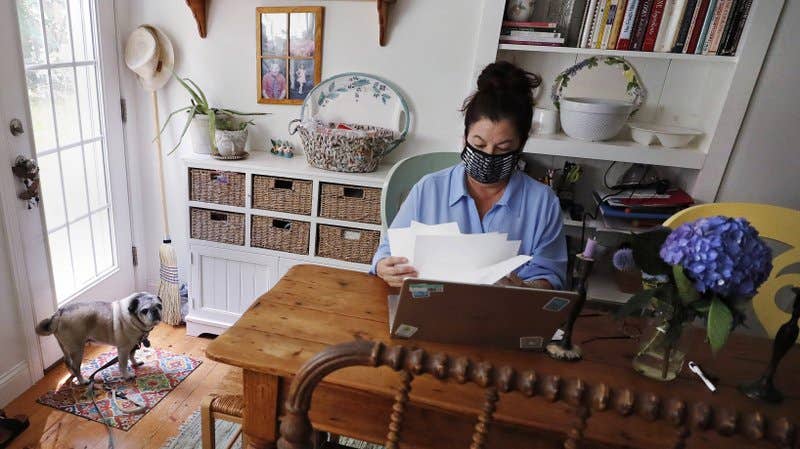Weekly poems elevate New Hampshire city’s virus newsletters
In addition to the endless Zoom meeting invitations, each week brings a new poem tucked into otherwise matter-of-fact messages

[Aug. 6, 2020: AP News]
Valerie Rochon is eager to read her email every Monday morning, even when it makes her cry.
In addition to the endless Zoom meeting invitations, each week brings a new poem tucked into otherwise matter-of-fact messages about the coronavirus pandemic from the Portsmouth city manager. Tammi Truax, the city’s poet laureate, has been contributing to the newsletters since early April, elevating the collection of public health updates and community resources with a layer of emotion and introspection.
“I think she’s absolutely brilliant,” said Rochon, who leads the Portsmouth chamber of commerce. “I look forward on Monday mornings to getting my week started with the wisdom and beauty that she shares.”
When she was named poet laureate last year, Truax planned multiple projects around the theme “Poetry as a Bridge,” including using poetry to cultivate a more meaningful relationship between the residents of Portsmouth and its sister city of Nichinan, Japan.
But after a planned trip there with high school students was scrapped in April due to the pandemic, she instead she wrote a poem honoring the nursing students whose graduation they were supposed to attend. And she has been highlighting Japanese forms of poetry, such as haiku — “Some nights are so dark/that the moon alone is sure/morning will come” — and tanka, which she described as more personal and metaphorical — “The bramble extends/a thorny cane offering/perfect raspberries/while everywhere else I look/an imperfect world festers.
Like these kind of stories? Get The Brighter Side of News' newsletter.
Having long believed in the power of poetry to help people through difficult times, Truax said she gladly took on the challenge of composing poems weekly, even though that’s different from her usual process. Often she doesn’t write the poem until the day she submits it.
“Sometimes things are percolating all week long, and sometimes on Saturday morning I have no idea,” she said. “But we are living through extraordinary times, and every week seems to provide ample material for me to respond to.”
One poem evokes the toppling of monuments — a nod to the Black Lives Matter movement — while another describes police in Madrid delivering bouquets of tulips to hospital workers.
For the July 4 holiday weekend, she produced a “found poem” by extracting words from an Alexander Hamilton essay. The following week she marked the birthday of Frida Kahlo with a poem questioning what the artist, who was bedridden for months due to illness and later injury, would make of “those of us bemoaning isolation” and unwilling “to forego what we want, think we need, do desire.”
The Portsmouth public library is including the poems in a “community diary” documenting the pandemic, and the poem about the Nichinan nurses will be read at their delayed graduation ceremony in October.
“This really does have ripples that extend out,” said Stephanie Seacord, Portsmouth’s public information officer, who compiles the newsletter and came up with the idea of asking Truax to contribute, starting April 5.
“I thought, maybe we can offer a moment of calm in this sea of craziness,” Seacord said. “But now, to me, it has a life in that it’s part of the new normal. It’s part of the archive of what we’re all living through.”
Rochon said she was particularly touched by Truax’s latest poem, “Transitions,” in which she grieve’s a fellow poet’s impending death, hiding her tears behind her face mask and finding solace in harvesting a zucchini from her garden and baking it into bread for the young man who fixed her car.
“We all do that, don’t we? Whether we go into work, or go on a 20-mile bike ride, whatever it is, we all do that, just to be able to absorb that grief,” Rochon said. “It puts you in touch with something that’s real, and there’s a lot to be said for that.”.... Read More
Joseph Shavit
Head Science News Writer | Communicating Innovation & Discovery
Based in Los Angeles, Joseph Shavit is an accomplished science journalist, head science news writer and co-founder at The Brighter Side of News, where he translates cutting-edge discoveries into compelling stories for a broad audience. With a strong background spanning science, business, product management, media leadership, and entrepreneurship, Joseph brings a unique perspective to science communication. His expertise allows him to uncover the intersection of technological advancements and market potential, shedding light on how groundbreaking research evolves into transformative products and industries.
